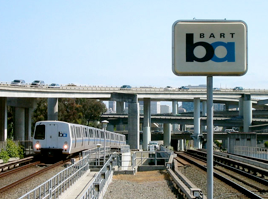Possible BART Strike May Start as Soon as Monday
By: Lia Schallert
Yesterday, Service Employees International Union (SEIU) Local 1021 and Amalgamated Transit Union (ATU) Local 1555, the two major unions representing 2,375 BART employees, voted in favor of authorizing a strike.
Ongoing negotiations have so far failed to bring the unions and BART management closer to an agreement. Both sides agree on one thing – a BART strike is possible as early as Monday, July 1.
Unions and BART Management Disagree Over Employee Benefits
A spokesperson for SEIU Local 1021 said negotiations focused on safety issues, including poor lighting in tunnels that would jeopardize worker and passenger safety in the event of an emergency evacuation.
A spokesperson for BART stated instead that discussions have centered on employee salaries and work benefits, namely, how much employees must contribute to their pensions and monthly health care payments, currently at a flat $92 rate. BART also hopes to prevent employees who call in sick from collecting overtime pay if they work an extra day. BART management has argued it must reduce costs to raise the $15 billion it needs to pay for new rail cars, create a train maintenance facility, and renew the train control system.
The unions, on the other hand, say that BART misrepresented its budget and has generated a $125 million operating surplus. They argue that workers are entitled to some of that money and have proposed a five percent annual raise over the next three years subject to an annual cost of living adjustment.
Will BART Employees Strike on Monday? Commuters May Need Transit Alternatives
BART officials are anticipating major gridlock and transit chaos should the strike go in effect Monday morning and are urging commuters to prepare. The last BART strike of 1997 caused major traffic jams, and the number of BART rides since then has jumped from 275,000 rides a day to about 400,000 rides today.
Transbay Commute Alternatives to BART:
 In preparation, AC Transit will have extra transbay bus service to and from the city. AC Transit plans to run an additional service shuttle during peak commute hours between 20th Street and Broadway transit center in downtown Oakland and the San Francisco Transbay terminal. Those buses will run every three to five minutes.
In preparation, AC Transit will have extra transbay bus service to and from the city. AC Transit plans to run an additional service shuttle during peak commute hours between 20th Street and Broadway transit center in downtown Oakland and the San Francisco Transbay terminal. Those buses will run every three to five minutes.
6/28/13 – UPDATE: AC Transit workers may also strike on Monday – possibly leaving the AC Transit Transbay buslines out of the list of possible BART commute alternatives between the East Bay and San Francisco. Check back here for updates.
The San Francisco Bay Ferries, which serve Oakland, Alameda, Harbor Bay, and Vallejo, will increase their boats for commuters.
San Francisco-to-South Bay Commute Alternatives:
For commuters traveling down south toward Millbrae, samTrans will provide free shuttle service between the Colma and Daly City BART stations and also from the San Francisco-Daly City border portion of Mission street where riders can connect to Muni.
Unfortunately, Caltrain can’t guarantee increased service in response to the possible BART strike due to its trains being “already at capacity or near capacity during the peak commute” and also due to longer trains not always fitting in the stations, according to Caltrain spokeswoman Christine Dunn.
For BART commuters who transfer to the Santa Clara Valley Transportation Authority (VTA) light rail system, check back for updates on their service alternatives.
Muni as the Main Alternative to BART Within San Francisco:
Of course, for all of us who prefer riding BART within the City, there is always Muni. Although, let your boss know, it is only on time for about half the runs.








